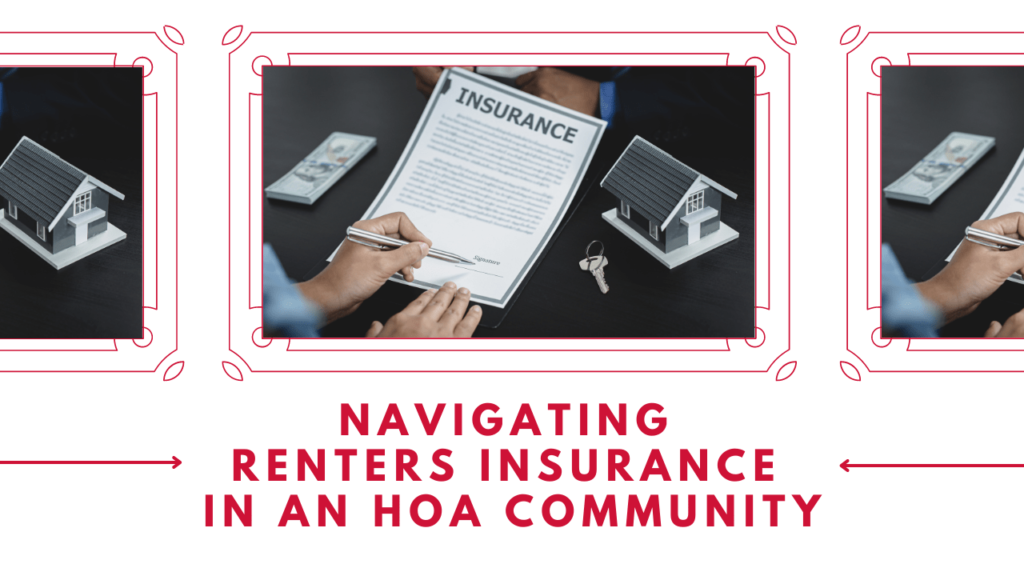In California HOAs, renters within that association can be required to carry an HO-4 policy which protects their personal property against loss and limits exposure to personal liability claims. If you don’t already require renters insurance, you should consider amending your CC&Rs to require that tenants in your community carry insurance.
To avoid potential liability, you should also put something in writing that relieves the association of enforcement requirements related to the need for renters insurance. That’s something that homeowners in your community should enforce with their tenants.
It’s a good idea to regularly publish reminders that owners and renters need to carry their own insurance while living in your HOA.
Here’s why it’s necessary and how you can navigate the requirement as an HOA board.
HOA Insurance Rarely Extends to Rental Properties
HOA insurance is one of the costs covered by dues paid by HOA residents.
Most HOA insurance policies operate as a form of property and liability insurance. It’s often referred to as an HOA master insurance policy, and it will cover liability for injuries that may occur in common areas of the association. Most master policies also include coverage for repairs and replacement costs that are incurred from damage that’s done to common spaces and elements.
HOA insurance protects the association financially. Many policies will cover the legal expenses required if the HOA gets sued.
What you need to know as an HOA board or a property owner who is renting out their home in an HOA community is that the HOA policy does not extend to rental properties. As a homeowner, you need to purchase your own homeowner insurance policy. Your tenants should also be required to purchase their own renters insurance policy.
If a homeowner in an HOA community is only renting out a room in the home where they also live, the homeowners insurance policy should be adequate. But, when you’re renting out an entire home or condo unit, it’s essential that tenants purchase their own coverage. Landlord insurance typically does not cover a tenant’s personal items.
Renters Insurance and What it Covers
Renters insurance is an insurance policy that is designed for tenants who rent or lease their living space from another person or entity. Homeowners buy enough insurance to cover both the inside and outside of the home. But renters are not responsible for the building. They need to cover the personal property, furniture, and belongings that are inside the home.
Renters also need liability coverage. There could be unintentional damage caused by the tenant or injury that results from a tenant’s action.
Typically, a renters insurance policy will cover personal property, personal liability, and medical payments, as well as loss-of-use:
-
Personal Property Coverage
Fires often cause billions of dollars of damage every year inside homes. A renters insurance policy will cover fires, theft, falling objects, and vandalism. If a tenant’s belongings are damaged by a tree crashing through a window or a break-in, the personal property portion of renters insurance covers the tenants and their belongings.
While a fire will destroy property and a tenant won’t get that property back, they’ll still be able to collect the monetary value of anything that was lost.
Tenants should be encouraged to choose an amount of insurance that reflects the value of their personal property. They don’t want to be left underinsured, and they can also purchase additional optional coverage for items such as jewelry and fine art.
-
Liability Coverage
A landlord insurance policy will include liability insurance for a rental property, but it only covers the landlord’s liability. A tenant’s liability is not covered under the landlord policy.
Personal liability coverage on a renters insurance policy helps tenants pay for the medical bills of another person who may become injured due to a tenant’s action or neglect. Even if there is an accident or an unintentional injury, a tenant can be held responsible for the injury that occurs. For example, if a tenant’s guest falls down the stairs, the renters insurance policy will help with medical bills.
Property repairs are also covered if the tenant is found to be responsible for damage. Maybe a tenant’s child breaks a window by throwing a ball or damages an appliance by jumping on it. Perhaps a stove is left on and a kitchen fire starts. These situations are the responsibility of the tenant, and a renters policy will be necessary to cover the loss.
-
Loss of Use Coverage
If a tenant cannot live in their home due to a covered claim, an insurance policy will pay for their accommodation elsewhere. This coverage begins at the time of claim and ends when the rental home is repaired and the tenant can move back in.
Write the Insurance Requirement into Lease Agreements
 Tenants moving into an HOA property understand that they’re responsible for following the lease agreement as well as the rules and regulations set forth by the HOA.
Tenants moving into an HOA property understand that they’re responsible for following the lease agreement as well as the rules and regulations set forth by the HOA.
When you’re renting out a property in an association, you’ll want to be clear about the insurance requirement. Include it in the lease agreement, and reinforce the requirement when you talk to tenants before move-in. You can ask to see proof of coverage and you can even be added as an additional insured so that you’re notified immediately if the coverage lapses or cancels.
As HOA property managers, we believe that insurance is one of the best ways to protect individual properties and the entire community. It’s important that the HOA has its own coverage, the property owners have their homeowners insurance, and the tenants have their own renters insurance. You don’t want anyone living in your community to suddenly realize they’re not covered when a catastrophe occurs.
We’d be happy to help you navigate the renters insurance requirement in your HOA or in your HOA rental property. Contact us at Hill & Co. so we can tell you more about the HOA services we provide in California for HOA boards and community associations just like yours. We can deliver full-service management or virtual management if you’re looking for something more flexible and cost-effective.

